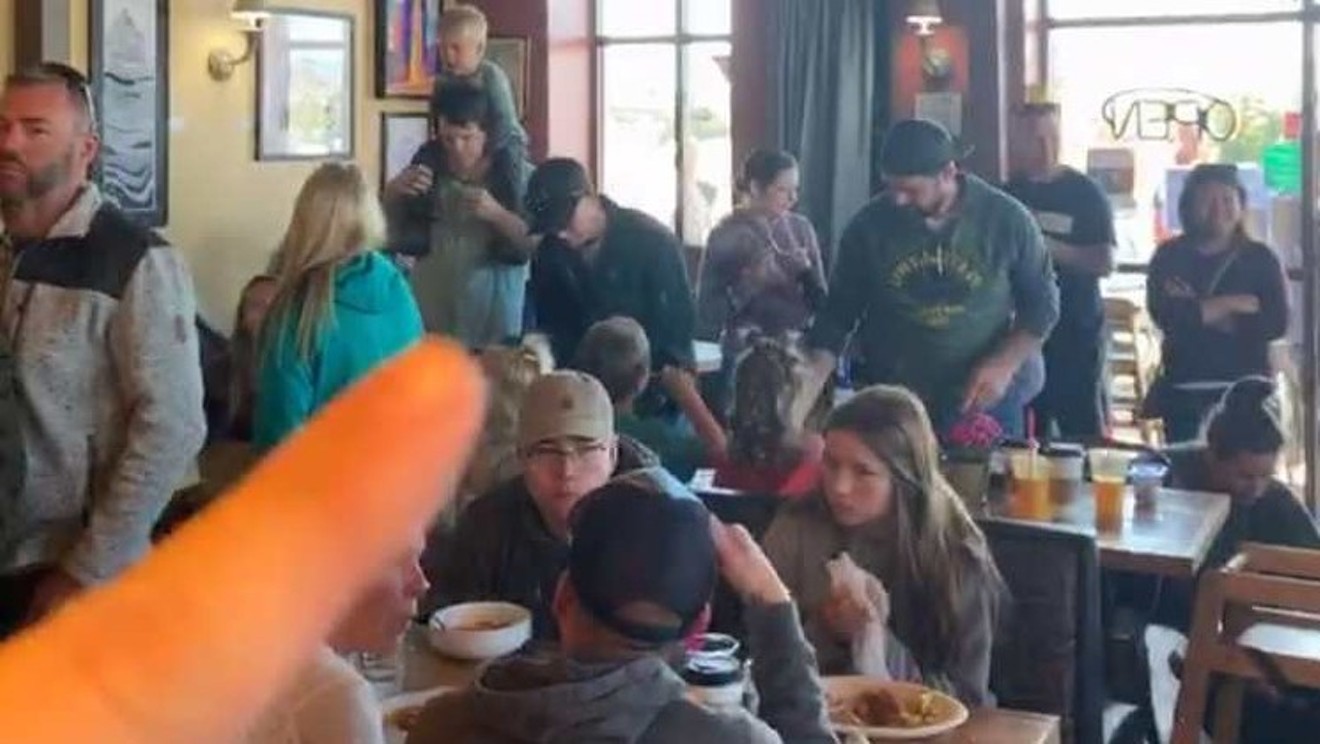Fears that Colorado would earn embarrassing national headlines over Memorial Day — for parties like one last week at Boulder Creek that violated pretty much every safety recommendation related to COVID-19 — failed to materialize, thanks in part to Mother Nature; much of the weekend was rainy, and temperatures fell short of toasty.
Instead, the focus was on restaurants after Governor Jared Polis confirmed that eateries can reopen with limitations on May 27, even as a media-savvy attorney filed a double-fisted lawsuit on behalf of a Castle Rock diner that previously stoked the governor's wrath over its unauthorized Mother's Day return.
The reopening guidelines, released on May 24, reflect some changes from the draft guidelines shared publicly a few days earlier and offer more details — such as an initial on-premises capacity of 50 percent, or a maximum of fifty, as well as a repeated emphasis on outdoor dining, which is perceived as healthier and also more conducive to social distancing. (At least 375 restaurants in Denver have applied for permission to expand service onto sidewalks, parking lots and the like.) Mask use for employees and a six-foot distance between tables are also mandated.
Strictly forbidden is the approach briefly demonstrated by C&C Breakfast & Korean Kitchen (so named in the lawsuit), which, as documented by a May 10 video that soon went viral, was virtually a mask-free zone in which social distancing was nonexistent. But the decision by officials to indefinitely yank the diner's license for these violations is attacked in the complaint filed by lawyer and KNUS radio personality Randy Corporon, who represents owners Jesse and April Arellano and their corporate entity, Cookies and Crema LLC. The defendants are the Colorado Department of Public Health and Environment and its executive director, Jill Hunsaker Ryan, as well as Tri-County Health and Polis.
In the introduction to the suit, submitted to Douglas County District Court on May 22, Corporon doesn't mince words. "The matter before this Honorable Court is more than just a case of executive authority overreach and constitutional violations," he contends. "It implicates core principles of our nation's founding and the rule of law."
How so? Corporon argues that since the first cases of the novel coronavirus were reported in the U.S. in January, "various governmental entities across the country have been implementing various sweeping and economically devastating schemes in response to fluctuating, often inaccurate protections of COVID-19 related mass illness and death. Colorado's governor, Jared Polis, initially shut down the state and ordered people to stay home and now, nearly ten weeks later, continues arbitrarily categorizing essential and non-essential businesses to the extreme detriment of Plaintiffs."
These tactics are particularly problematic from Corporon's point of view since "the 68 days, so far, of Governor Polis's exercise of 'emergency powers' has continued in spite of the fact that over 30 percent of all COVID-19 attributed deaths are confined to one state (New York), over 80 percent of deaths are confined to twelve primarily coastal states, and only 1 percent of the deaths have occurred in Colorado."
Corporon stresses that the plaintiffs aren't "asking the Court to weigh the scientific disputes over the extent of the danger COVID-19 presents because the Defendants have not provided any formal findings or opportunities for presenting contrary opinions. At issue is whether the rule of law and confidence in our constitutional republic will be maintained regardless of whether the Governor and other unelected agency officials conclude that COVID-19 poses, or continues to pose, an imminent health threat."
His conclusion: "Certainly, the Plaintiffs opening their restaurant to customers, when so many other businesses are permitted to open their doors to customers, does not constitute an 'imminent health threat.'" And he also castigates Polis for calling out C&C by name, thereby making an example of the business in ways that could have long-term negative consequences.
The governor's office isn't commenting on the lawsuit. But in a news release about the reopening rules, Polis offers a statement that underscores his contention that all decisions about dining establishments have been driven by data. "Coloradans value our diverse culinary scene and amazing restaurants, and I’m proud that our state is now providing science-based guidelines on how restaurants can open as safely as reasonably possible for their employees and customers," the governor said. "Diners will have more space between tables and at many restaurants, more opportunities to eat outside. The safest thing anyone can do is stay home whenever possible, but for those who want to shop and dine, we want to make sure it can be done as safely as possible."
Click to read the C&C Breakfast & Korean Kitchen lawsuit.
[
{
"name": "Air - MediumRectangle - Inline Content - Mobile Display Size",
"component": "12017618",
"insertPoint": "2",
"requiredCountToDisplay": "2"
},{
"name": "Editor Picks",
"component": "17242653",
"insertPoint": "4",
"requiredCountToDisplay": "1"
},{
"name": "Inline Links",
"component": "18838239",
"insertPoint": "8th",
"startingPoint": 8,
"requiredCountToDisplay": "7",
"maxInsertions": 25
},{
"name": "Air - MediumRectangle - Combo - Inline Content",
"component": "17261320",
"insertPoint": "8th",
"startingPoint": 8,
"requiredCountToDisplay": "7",
"maxInsertions": 25
},{
"name": "Inline Links",
"component": "18838239",
"insertPoint": "8th",
"startingPoint": 12,
"requiredCountToDisplay": "11",
"maxInsertions": 25
},{
"name": "Air - Leaderboard Tower - Combo - Inline Content",
"component": "17261321",
"insertPoint": "8th",
"startingPoint": 12,
"requiredCountToDisplay": "11",
"maxInsertions": 25
}
]












